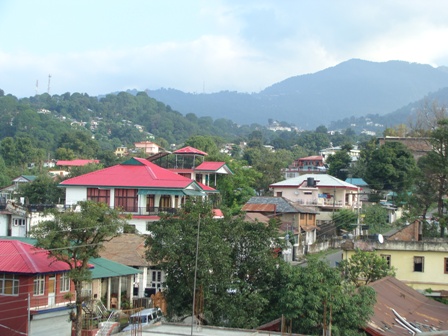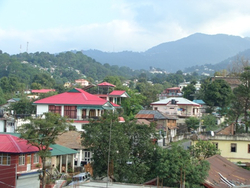Mandi and Dharamsala advance on their ICLEI ACCCRN Process path

Shared Learning Dialogues were organised in Indian cities Dharamsala and Mandi by ICLEI South Asia with the climate core team of Dharamsala and Mandi under the Rockefeller Foundation sponsored Asian Cities Climate Change Resilience Network (ACCCRN) project on 23rd and 26th of September, 2014. The broad objective of the visit was to execute ICLEI ACCCRN process (IAP) in the cities – Phase II “Climate Research and Impact Assessment” in Dharamsala and Phase III “Vulnerabilities Assessment” in Mandi.
In Dharamsala past climatic events and their impact on urban systems have been identified. Increased temperature and decreased frequency and intensity of precipitation in general (but increased frequency of extreme rainfall) were identified as the two critical climatic risks while municipal solid waste, transportation, urban planning and sanitation were identified as the most critical fragile urban systems. Actual impacts of climate change on respective urban system and impacts of fragile system on the local environment have also been discussed with the stakeholders. Risk analysis of the Urban Fragile Systems has been carried out based on the perception of the stakeholder group on likelihood and consequences of each impact on these urban systems.
Mr. Lalit Kumar, Executive Officer, Dharamsala Municipal Council conveyed to all the participants, “I am glad and applaud ICLEI South Asia efforts of carrying such an important exercise of identifying actual impacts of past climatic event and how we could improve the resilience of our urban system to better manage the natural hazard risk and thus place us on a better footing to withstand future disasters”.
While in Mandi, the core team and stakeholders with close support from ICLEI South Asia have looked at the climate impacted areas of the city, mapped the vulnerability hotspots and have identified the actors/stakeholders most affected or instrumental in responses. Adaptive capacities of all the identified actors and fragile urban systems have also been critically analysed. Concerned officials from various departments like IPH, PWD, Forest, Energy, Health and Local NGOs have participated and shared critical inputs on vulnerable urban system. During the technical sessions, the climate core team and the stakeholders have identified ward number 2 and 4 and areas near the water bodies (Sukhati Khad and Beas river bank) as the vulnerable hotspots and Solid Waste, Sanitation, Drainage, Transportation, Urban Planning, and Ecosystem as the six most fragile system. Participants have stressed upon the need of integrating stringent actions to reduce the climate risk and thus improving urban resilience.
Mr. Ajay Prashar, Executive Officer, Mandi Municipal Council during the meeting stated, “Mandi town is under serious threat to dangerous weather events which are nowadays becoming more frequent or severe, thus it is critical to identify vulnerable wards and actors and embark on concerted action that will deliver ongoing benefits to the economy and the community for years to come”.
Click here for further information on ACCCRN’s South Asian activities.
